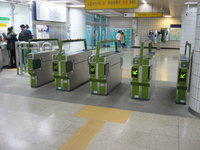If you have taken the Seoul Metropolitan Subway, you would have noticed that most of the automated ticket turnstiles are unblocked (see the picture below). When you slip your ticket into the turnstile, no gate needs to be opened to let you through - you just walk through. In contrast, in other subway systems such as those in Singapore, a valid ticket is needed to trigger open a gate in the turnstiles.
Seoul subway turnstile/fare gate

Source: http://www.nationmaster.com/encyclopedia/Seoul-Metropolitan-Subway
On reflection, the Seoul subway turnstile control is more efficient in that it doesn't have to open-shut a gate for EVERY passenger. Imagine if you have a million customers a day, a gate anywhere in the subway system must be opened-shut a total of 2 million times a day (once when you enter and once when you leave). Now these are mechanical devices which suffer wear and tear, and therefore have to be maintained fairly often to ensure that they operate optimally. This requires constant monitoring by humans, and I am sure you'll agree that that's never perfect. Haven't you ever had the uncomfortable and annoying experience of having these mechanical gates shut on you at the wrong moment in the wrong place?
In the Seoul subway system, the gates will only shut when you do not insert a valid ticket. Again, if there were a million passengers a day (more like 18 million according to statistics cited), none of these gates need to open-shut if every passenger possesses a valid ticket. There is lower maintenance cost and faster clearance of human traffic at these turnstiles.
Why are there two ways of doing things here? I suppose it boils down to your philosophy of people and people behaviour. In the Seoul system, the assumption is that you can trust people to do the right thing most of the time. In the Singapore system, you inherently distrust people, i.e. until they prove themselves in possession of a valid ticket. Ironically, passengers eventually bear the higher operating cost that results from nostly invalid assumptions made on their behalf (by the service providers). In management terms, the first operates on the principle of Management by Exception while the second is more akin to Management by Suspicion (sorry, this management principle has yet to achieve currency ;-)).
Can we have a change of management, please?






No comments:
Post a Comment